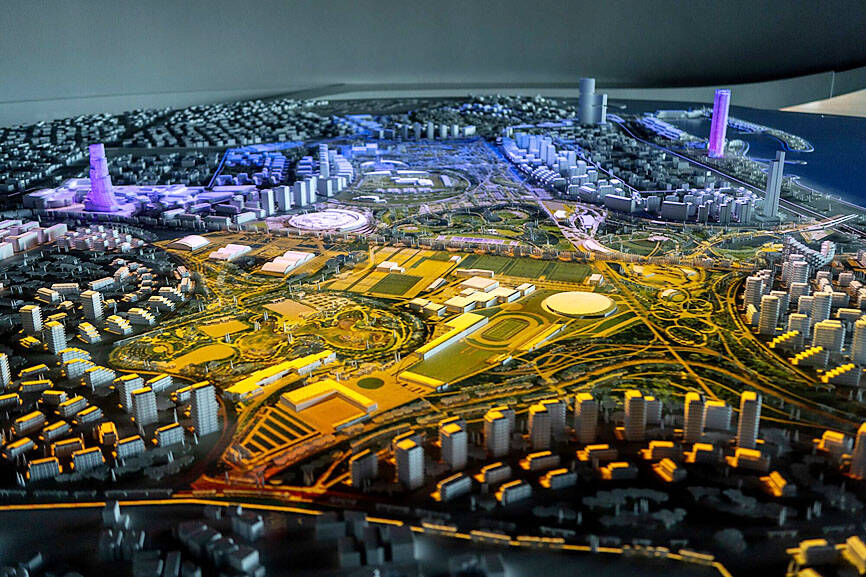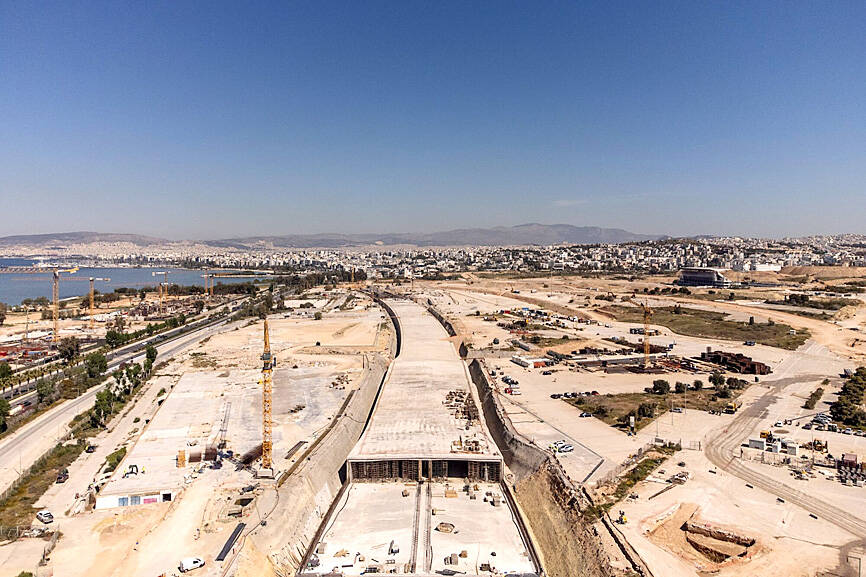High above the sparkling surface of the Athens coastline, the cranes for building the 50-floor luxury tower centerpiece of Greece’s future “smart city” look out over the Saronic Gulf.
At their feet, construction machinery stirs up dust.
Its backers say the 8 billion euro (US$8.43 billion) project financed by private funds is a symbol of Greece’s renaissance after the years of financial stagnation that saw investors flee the country.

Photo: Bloomberg
However, critics see it more as a future “ghetto for the rich.”
It is hard to imagine that 10km from the Acropolis, a new city “three times the size of Monaco” would rise from the ground by 2036, said Odisseas Athanasiou, chief executive officer of the group Lamda that owns the site.
One of Europe’s largest urban regeneration projects, the Ellinikon initiative features plans for villas, two hotels, shopping centers, a university, a marina and other buildings.

Photo: Bloomberg
It would also feature the Riviera Tower, which would be Athens’ tallest skyscraper when it is completed at the end of 2026.
About 30,000 people are expected to live on the 6.2km2 site on what for decades was Athens’ international airport.
The former terminal, a listed building since the airport relocated in 2001, is to be converted into an exhibition hall.
During the 2004 Olympic Games, Ellinikon became a sports hub and hosted sports competitions including canoeing and hockey.
However, the facilities were subsequently abandoned, and then came the financial crisis, which hit the Greeks hard.
Solidarity groups created a self-managed garden, a community grocery shop and a free medical center at Ellinikon, to make up for the shortcomings of a virtually bankrupt state.
Refugees were also temporarily housed in the derelict stadiums during the migrant crisis of 2015.
Amid the wave of privatizations imposed by the country’s EU-IMF creditors, Athens was forced to sell Ellinikon.
Lamda, a holding company specializing in property development, investment and management, won the bid in 2014 for less than 1 billion euros.
The company is listed on the stock exchange and majority-owned by Greek tycoon Spiros Latsis.
The company is building “the largest coastal park in the world,” with one-third of the surface area reserved for green areas accessible to all, Athanasiou said.
Ellinikon would be a “smart city” with advanced technological solutions, other project managers said.
“We’re building from scratch, which is a major advantage,” Athanasiou said in front of a huge model of the project. “Cities like Singapore, Copenhagen and Amsterdam have done incredible things in terms of technology. But they have had to adapt what they have developed to an existing infrastructure.”
The park would have 8,000 to 9,000 homes.
The most luxurious apartments in the Riviera Tower can cost up to 25 million euros, Athanasiou said.
The least expensive would sell for around 400,000 euros, a price entirely unaffordable for many Athenians, critics say.
“This is not a real-estate development project, it’s an ‘offshore’ colony,” said Nikos Belavilas, director of the urban environment laboratory at the National Technical University of Athens.
“We will have a gated community isolated from the city, with skyscrapers and casinos for the oil-rich,” he said, at a time when Athens is more in need of social or student housing.
The concrete-clad capital, with its jumbled streets that have grown out of control, is cruelly lacking in green areas.
Ellinikon, with its parks and beaches, represented “an opportunity to have a large urban green space,” Belavilas said.
It could have become an Athenian Tempelhof, he said, referring to the former West Berlin airport which was transformed into a huge park open to all in the center of the German capital.
The Ellinikon project is “dire on several levels,” especially in terms of the “macro-economic management of the country,” one Athenian architect said on condition of anonymity.
Other Greeks complain that the state simply flogged off the site.
Athanasiou counters that when the privatization took place “we were the only ones to respond to the call for tenders.”
The project would “strengthen the country’s credibility abroad, which was damaged during the years of crisis,” he said.
Up to 80,000 jobs would be created and the Greek state would reap more than 14 billion euros in tax revenue once the project is completed, he said.

GROWING OWINGS: While Luxembourg and China swapped the top three spots, the US continued to be the largest exposure for Taiwan for the 41st consecutive quarter The US remained the largest debtor nation to Taiwan’s banking sector for the 41st consecutive quarter at the end of September, after local banks’ exposure to the US market rose more than 2 percent from three months earlier, the central bank said. Exposure to the US increased to US$198.896 billion, up US$4.026 billion, or 2.07 percent, from US$194.87 billion in the previous quarter, data released by the central bank showed on Friday. Of the increase, about US$1.4 billion came from banks’ investments in securitized products and interbank loans in the US, while another US$2.6 billion stemmed from trust assets, including mutual funds,

AI TALENT: No financial details were released about the deal, in which top Groq executives, including its CEO, would join Nvidia to help advance the technology Nvidia Corp has agreed to a licensing deal with artificial intelligence (AI) start-up Groq, furthering its investments in companies connected to the AI boom and gaining the right to add a new type of technology to its products. The world’s largest publicly traded company has paid for the right to use Groq’s technology and is to integrate its chip design into future products. Some of the start-up’s executives are leaving to join Nvidia to help with that effort, the companies said. Groq would continue as an independent company with a new chief executive, it said on Wednesday in a post on its Web

Micron Memory Taiwan Co (台灣美光), a subsidiary of US memorychip maker Micron Technology Inc, has been granted a NT$4.7 billion (US$149.5 million) subsidy under the Ministry of Economic Affairs A+ Corporate Innovation and R&D Enhancement program, the ministry said yesterday. The US memorychip maker’s program aims to back the development of high-performance and high-bandwidth memory chips with a total budget of NT$11.75 billion, the ministry said. Aside from the government funding, Micron is to inject the remaining investment of NT$7.06 billion as the company applied to participate the government’s Global Innovation Partnership Program to deepen technology cooperation, a ministry official told the

JOINT EFFORTS: MediaTek would partner with Denso to develop custom chips to support the car-part specialist company’s driver-assist systems in an expanding market MediaTek Inc (聯發科), the world’s largest mobile phone chip designer, yesterday said it is working closely with Japan’s Denso Corp to build a custom automotive system-on-chip (SoC) solution tailored for advanced driver-assistance systems and cockpit systems, adding another customer to its new application-specific IC (ASIC) business. This effort merges Denso’s automotive-grade safety expertise and deep vehicle integration with MediaTek’s technologies cultivated through the development of Media- Tek’s Dimensity AX, leveraging efficient, high-performance SoCs and artificial intelligence (AI) capabilities to offer a scalable, production-ready platform for next-generation driver assistance, the company said in a statement yesterday. “Through this collaboration, we are bringing two